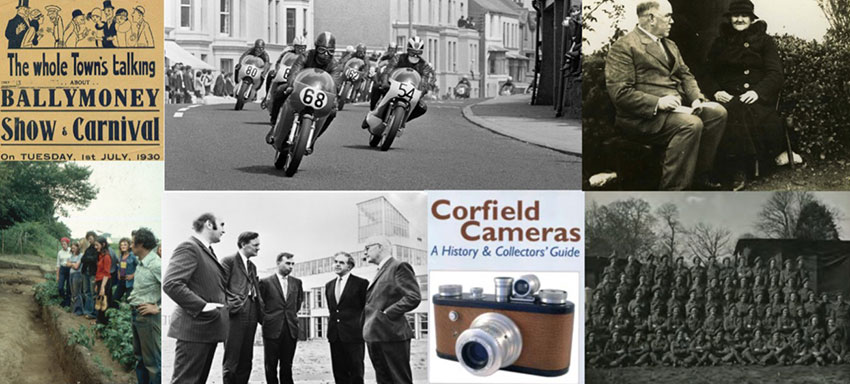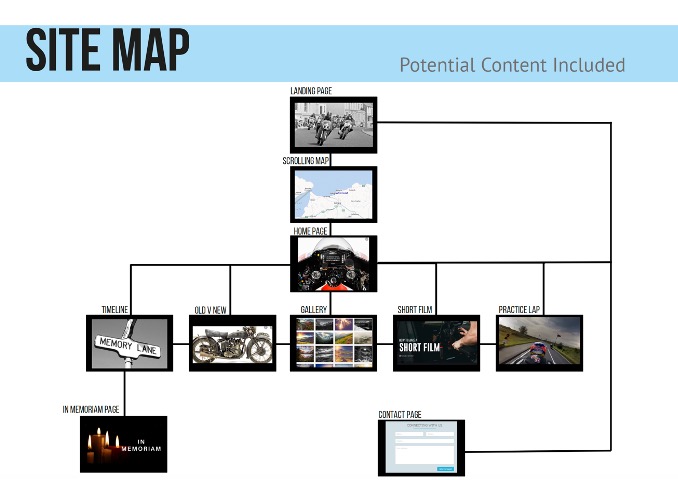By Dr Helen Jackson, Senior Lecturer, School of Communication and Media.
As part of a Covid-19 resilience museum project, Year 2 Interactive Media students from Ulster University’s Coleraine Campus have been working with Museum Services at Causeway Coast and Glens Borough Council to develop a range of interactive experiences to support Council’s NI100 programme.
With access to 10 different museum archives, students are repurposing these archival assets into an interactive online experience using an underlying documentary approach. These archives include: North West 200, Sam Henry, Corfield Photography Factory, George Shiels, Peter Woodman and the dig at Mountsandel, WWII Coleraine Battery, Charlie McAfee and the Ballymoney Show.
 Museum archive material being used in the digital project.
Museum archive material being used in the digital project.
Best practice methodologies
While digital interventions in the sector can facilitate and promote innovative forms of participation and engagement with archival content, challenges still exist in the design and delivery of non-invasive ICT solutions in the management of cultural heritage.
How to use ICT and immersive-based technology solutions to address the complex problems currently associated with digital interpretive methods (including false realism, constructedness and distance) are being resolved by the students in this project using best practice models found in Interactive Documentary practice.
Through this mode of design and development of an interactive solution, the archive object is understood authenticate a particular history, while the technology experience is used to illuminate the relationship between the object/archive and the present-day experience of the user that is consuming/engaging with the object. In this way, interactivity not conceived as a technology tool, but as a medium, that in itself will constructs particular meanings in the experience of online curated content.
Creating digital solutions
Year 2 Interactive Media students Ethan Hill and Chris Martin are working with the museum’s North West 200 archive to develop an interactive documentary experience for the north coast’s famous motorcycle road race.

Site map for the NW200 interactive documentary.
Ethan and Chris are locals to Portstewart and Portrush and both have strong connections to this event.
“I have family members who actually raced in the NW200 and still involved in its organisation. My father's business, Troggs, also part sponsored the event a few years back.”
Ethan Hill
“For the last 7 years I have been part of the Northern Ireland Fire & Rescue crew that provides safety cover during race week. So, this project is a really exciting opportunity for us to use our own experiences of the race to develop a really insightful interactive experience for new audiences.”
Chris Martin
As part of the development phase of the production, Chris and Ethan created a sitemap to reveal how the different audio and visual elements contained in the museum’s archive will be linked together through hyperlinks/ rollovers. This development of this sitemap is also critical is identifying how interactivity operates as a narrative feature in the user’s experience of the interactive documentary.
In addition to the use of the archive material, Chris and Ethan have scheduled a number of interviews to record stories from a number of people including an organiser of the event; a local fireman who provides safety cover during race week; and a local business (warden of Juniper Hill Holiday Park). With these three interviews the students hope to cover a range of narrative themes to include as digital content including nostalgia (‘what it was like back then’ and 'how things have changed over the years'); opportunities for local business who benefit from the event and the negative economic impact that Covid has had on this event; and opinions on the future of the event.
 Applying advanced coding techniques to the interface solutions.
Applying advanced coding techniques to the interface solutions.
With experience in coding techniques, the students are able to imaginatively resolve interface design concepts that enable intuitive access to the different digital assets hosted within the interactive documentary, and create meaningful and engaging interactive experiences for the user.
The final project solutions by the students will be hosted on niarchive.org
Dr Helen Jackson is a Senior Lecturer in Interactive Media and researcher at Ulster University working on the UKRI-funded project ‘Museums, Crisis and Covid-19: Vitality and Vulnerabilities’. This multi-disciplinary project team, led by Professor Elizabeth Crooke, is investigating how the museum sector will emerge and refocus in the aftermath of the Covid-19 crisis.
